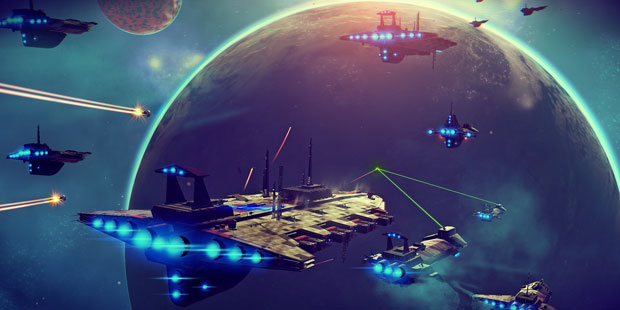If Only No Man's Sky Could Go Unreleased Forever
In support of dreams
I'm a little sad that No Man's Sky is being released.
This is surely not an uncommon feeling: sometimes the long weeks of anticipation leading up to Christmas are more fun than the day itself, which has the weight of expectation placed upon it and is, in any case, quickly devoured. With enough experience, you learn to savour the anticipation for its own sake.
No Man's Sky's procedural universe will not be as easily chewed through as a Christmas turkey Quorn log, but its release still marks the end of No Man's Sky as a horizon-dwelling object of pure imagination and the beginning of its life as something more real and undoubtedly more finite.
I have experienced this before, of course. Once upon a time, the game I was looking forward to most was Black & White. "Looking forward to" is probably an understatement. I ached for that game. It's embarrassing now to think how much frustrated longing I felt for a product, but I was young and of course blissfully naive. I searched out every morsel about the game I could find in magazines and on the internet and swallowed it all. The colourful world, the giant animals, the promise of funny little stories playing out between the two, these things captured my imagination.
I was just beginning to become interested in games beyond playing them, too. Black & White's developers wrote a lot about the making of the game, and therefore long before release I had not only heard about the advances it was making in mouse controls and AI, but had seen the toil and trouble it was taking to make those systems work. I remember one particular story of a giant monkey who picked up a pig to eat, only for the monkey to disappear suddenly and the pig to fall back to earth. It turned out, apparently, that the pig had been about to take a bite at the moment the monkey had hoisted him into the air, and without restrictions making it impossible, the pig had eaten the much larger monkey whole. I was convinced - by this story of a bug, of all things - that Black & White was going to be wondrous.
I didn't do the mental arithmetic required to imagine what Black & White would be like to play. It never clicked that I'd never read a story about a challenge or mission in the game that sounded fun. I just saw technical breakthroughs, daring design, funny giant animals and thought: "Yes, this is the future of games."
When Black & White came out, I was naturally crushed. I liked the game - making apologies for its missions, even - but it was not what I had hoped it to be. It wasn't just the things that were actually wrong with it, of which there were many. It was simply that it was a real, solid thing, with all the roughness and jaggedness and unpleasantness of real things when compared to their ephemeral, perfect, conceptual selves.
I've never fallen for a game the same way since. The next that came closest was probably Spore, Will Wright's attempt to put players in charge of the evolution of a species across multiple games-in-one. It sounded like a miracle: a game in which you could take a species from a single cell organism to a space-faring race, in which your decisions in each stage would be reflected in the appearance and culture of the society that followed. It was also a similarly talked about game to Black & White, with the marketing campaign not only showing trailers and action but offering some glimpse of how the game was being made. I knew enough to be impressed by the ability to share creatures via image files over a global network, and for each player's worlds to be filled by the creativity of other players automatically.
I also knew enough by then to ask the right questions, though. "What do you actually do in Spore?" I'd watch videos and think: "That cellular-level game looks a bit shat-o, doesn't it?" and "This RTS bit seems woefully dull."
Like Black & White, I enjoyed Spore despite all its flaws. I probably enjoyed it more for not having such high expectations.
I probably enjoyed its pre-release period a lot less for not having such high expectations.
Since then, I've come to think of a game's development as an extension of the pleasures of playing the game post-release. I like reading stories about how games are made, and watching trailers to imagine what they might be like to play. I sometimes like these things more than I like the eventual games themselves. The two halves of the experience are connected but hold little bearing over one another.
No Man's Sky has, during its development, followed a similar path to those games. I know an awful lot about its technical wizardry, about the procedural generation of galaxies and the animation of creatures and about the feeling of mystery it's aiming to inspire. I've enjoyed every minute of watching its trailers and imagining the excitement of visiting its worlds.
But then, I have those questions. "What do you actually do in No Man's Sky?" I watch the videos and think: "That shooting looks a bit shat-o, doesn't it?" and "You have to gather resources to fuel space-jumps; am I just going to be punching differently coloured trees like in all those other games?"
Whatever the answers, No Man's Sky seems certain to burn out in my affections more quickly when it's finally here than when it was all just a distant dream in the mind's of its developers. If only it could have stayed as a shared dream for longer.












